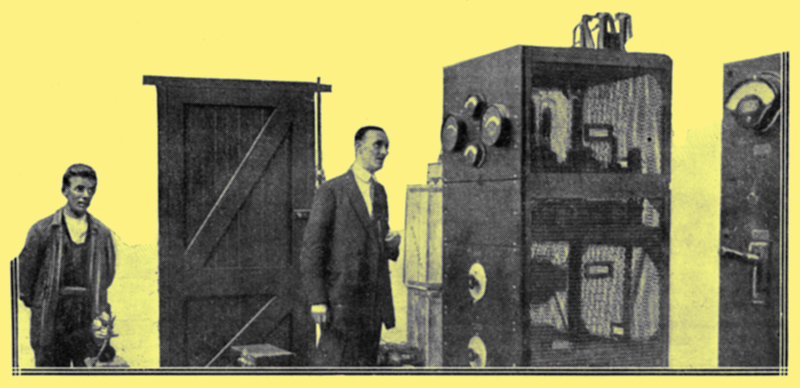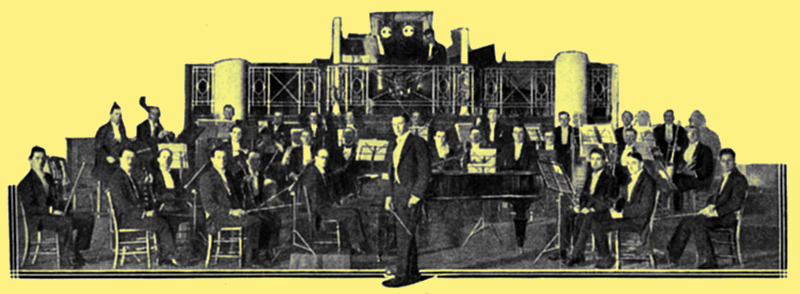|
Duplication of effort expense must be avoided. That is the keynote of the BBC's new policy of centralisation - a policy which is clearly explained by the Director-General of the BBC in this article, the second of a series he is specially contributing to Modern Wireless.
A dictionary would probably define 'Centralisation' bringing into a central system or under one control. The term and the process refer usually to administrative arrangements. The BBC, or rather British Broadcasting, has always on this basis been centralised. If the word is being used to apply to a service, it means more or less the same as monopoly. Broadcasting has always been a monopoly in this country, and other countries are more and more disposed to adopt it - with the notable and, one might say, notorious exception of the United States of America.

A recent studio portrait of the Director-General of the BBC.
The Business Tendency
There is little evidence oi alarm on this point nowadays - nor dislike of it either. Quite the contrary in fact. So, if there is any concern about centralisation, it is on another issue.
Centralisation on London happens to be one of the great business perplexities of the day. Nothing to do with broadcasting this. Concerns which have prospered for a century or more in provincial cities are increasingly finding it advisable and often necessary to establish a London office and even to move to London. Most people regret this - not only those chiefly concerned; but it continues. It seems inevitable. No one deliberately began it. It is the outcome of circumstance.
We had better be clear what centralisation in connection with broadcasting now means. It is not central management - one system instead of many competitive ones. It is not any method of accounting or store-keeping or purchasing, or even of technical control. These are of sectional and limited interest.
It does not, for instance, make any difference to the artistes or speakers whether they receive their cheques from the local station or from headquarters, provided always they have them without delay. It is centralisation in the provision of programmes which excites interest and, to some extent and in some quarters, disquietude.
What do listeners expect of a broadcasting company? Programmes of course; good programmes. The best possible; better than any other company in the same country, or in any country. Also high technical quality, good signal strength and so on. Further, they expect (or should do) a policy which recognises the great influence of broadcasting.
What the Listener Wants
Granted that listeners ought to get good programmes do they mind very much where they come from? Some do. Some do not. Some like their local station. Some want London all the time. If we say that listeners must get the best programmes, we are, by implication, saying that the place of origin as such is not a primary consideration. It may come in soon, but at first sight it ought not to matter where an item comes from if it is not only good, but as good as possible.
The BBC did not suddenly adopt a 'centralisation' policy for programmes. It did not adopt it at all. Not that the BBC was born with it. It might be said that the BBC did give birth to such an infant, but it was not a deliberate conception. Nor did anyone foresee the rapid growth of the prodigy. I can say when it happened - the very beginning of what is now known as centralisation in programmes.
Beginnings of SB
One night, in May, 1923, I spoke on the telephone from the Control Room at Savoy Hill, and asked the Director at Cardiff whether he would like to take some bagpipe music, then being played at Aberdeen, and broadcast it instead of his own item. He jumped at it. Captain Eckersley was beside me and his work had made this possible.
That was the beginning of 'simultaneous broadcasting' - and the beginning of 'centralisation'. In a few days news bulletins went regularly SB from London.
If a news bulletin, why not a specially important talk or address?
Sharing Programmes
Why not, as lines improved, special musical events? Not unnaturally it was mostly, but not entirely, London material. Soon some items had to be taken by all stations. For the rest, Directors used their own judgment based on the respective merits of SB and local material, and on local opinion as far as this could be assessed. As to local opinion, it was as usual, and after the novelty had worn off, divided. Some listeners wanted all local material, others all London; others liked a half-and-half arrangement.
In l926 anew factor appeared bringing acute embarrassments and anxieties - interference from European stations and a reduction of wavelengths. In course of time some British stations closed down, others had to use a common wave, which meant the programme being common also. Then, of course, there was the high-power and fewer stations policy.
Coming of High Power
When broadcasting began, no one thought of higher power than 3 kilowatts, or of telephone lines, or how inadequate the eight stations would prove to be. There were plenty of wave-lengths, and no trouble from abroad. The eight stations were followed by the eleven relays and by Daventry more relays were demanded.
The basis of distribution was impossible when rationing of channels came along. Under this system, however, stations were at first self contained - entirely dependent on local material. They were local possessions. In fact, they were too local to the particular city in which they were located for the inhabitants of other cities they had to serve.
If broadcasting were only beginning in 1930, but with all the 1922-29 technical experience somehow available, only high-power stations would be erected and programme centralisation would be inherent in some degree or other. It was not inherent in 1922. It was inconceivable. Also it was impossible. With changing conditions it came spontaneously and became inevitable.
Regional Responsibility
As mentioned above, the BBC has to give the best possible programmes, and at first sight that might be all there was to be said. As it happens it is not all. The Corporation is not party to indiscriminate centralisation on London. for programme material. There are three considerations. The first and second must be taken together. They are artistic and financial. These cover the national responsibility. The third is the local or regional responsibility. Duplication of effort and expense must be avoided.
Local Colour

This photograph of some of the apparatus at the old BBC station at Birmingham reminds us that the BBC of to-day is a triumph of quick growth. New stations have been built and old stations scrapped, in pursuit of Sir John Reiths relentless search for the ideal broadcasting service for Britain.
There is no point in doing a thing in any particular place which can be, and is being, done as well or better elsewhere, unless there are adequate and special reasons such as the encouragement of local resources, the inclusion of particular local interest, local colour, local features. The importance of these factors is fully recognised. How far they can be taken into account and interpreted in terms of local programmes cannot be stated in terms of hours or money, nor even of types of activity.
In the Scottish Region it was agreed some time ago that the maintenance of a large orchestra was not justifiable. A large saving of money results, but quality is not affected. There is still available by ether all the orchestral music required. When people consider the matter they usually come to see that it is unreasonable to maintain large orchestras shut up in studios. To assist public bodies such as the Choral and Orchestral Union in Glasgow, the Halle in Manchester, the Corporation in Birmingham, the National Orchestra of Wales in Cardiff, is money more profitably spent.
No criterion can be laid down as to the amount of SB and local work. It is important to note that SB does not necessarily mean London stuff.
Under the Regional Scheme the National waves for the Midlands, the North, the West and Scotland will transmit the same programme. (The position in Ulster is still unsettled.)
Its material will be chiefly but not exclusively London. Each Regional wave has available the London Regional programme material. There is no decision, and no decision yet possible, as to the extent to which it will draw on it. The amount will vary between centres. It will depend on local ingenuity and on material available locally, and on local interest. Quality and Finance and it will depend on considerations of quality and financial justification. The conditions under which local material was necessarily used in the early days of broadcasting should not prejudice fair consideration of the problem now.

This is the National Orchestra of Wales, conducted by Warwick Braithwaite, and it is in the support given to the great representative institutions of this kind that one benefit of centralisation is most strikingly demonstrated.

This is how Broadcasting House - the future headquarters of the BBC - will look when completed. Will it be the home of a great new form of art, or will the Radio Drama be not much more than a variation of stage technique?

The front cover of the magazine.
|